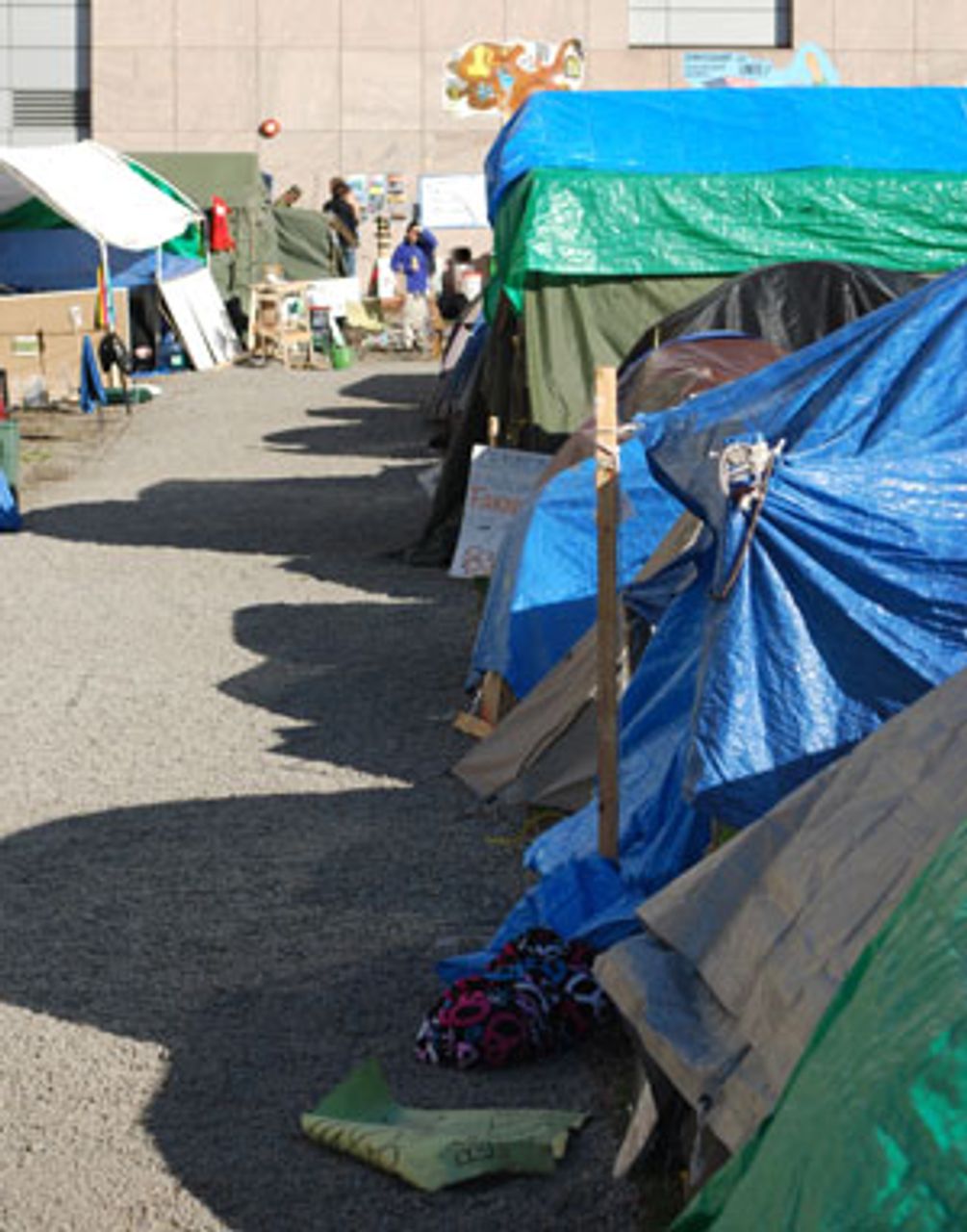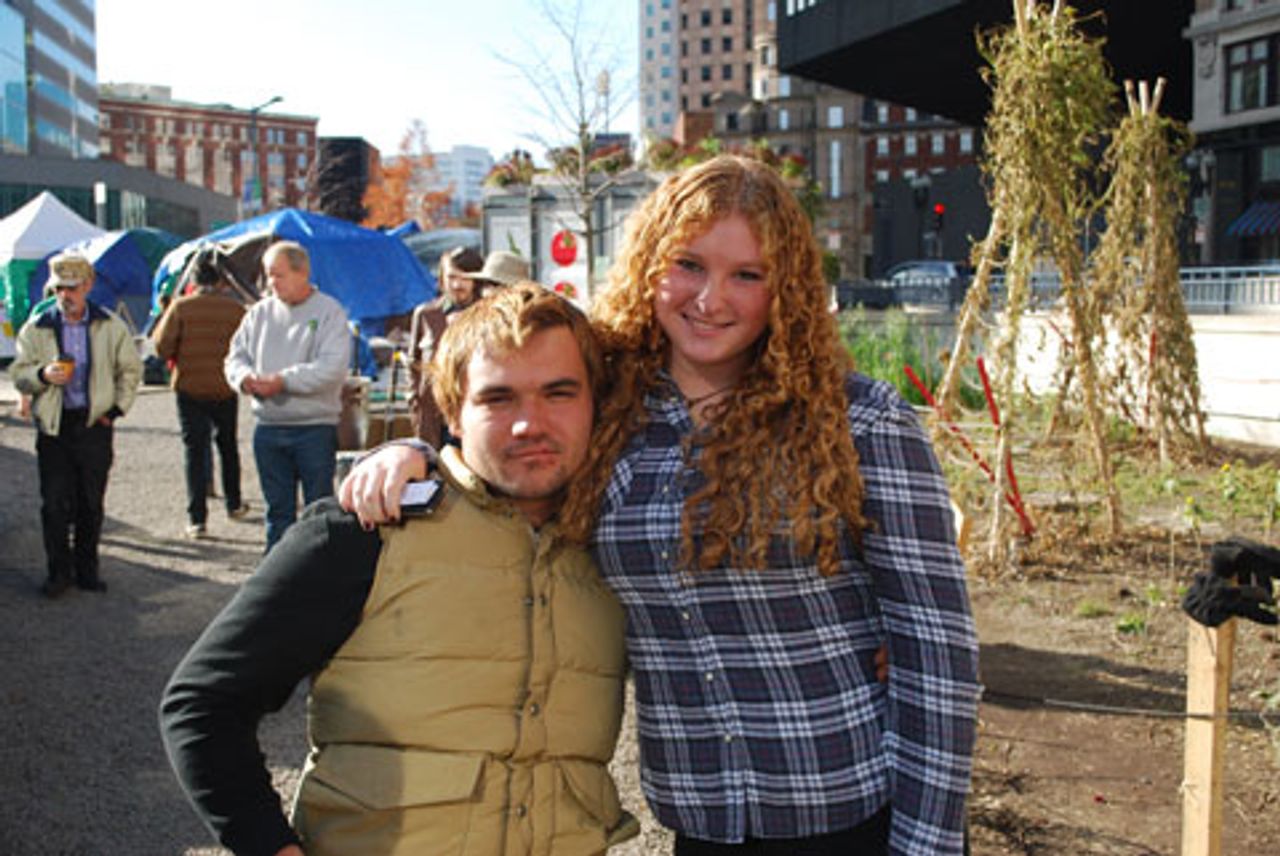 The Occupy Boston encampment
The Occupy Boston encampmentA restraining order barring the city of Boston from evicting Occupy Boston protesters will remain in effect temporarily while a judge considers her decision. Suffolk Superior Court Judge Frances A. McIntyre said Wednesday that she would decide no later than December 15 whether Mayor Thomas Menino’s administration will be indefinitely barred from forcibly shutting down the protest without prior court approval.
A temporary restraining order issued by the judge in mid-November barred evictions from the camp without a court order except in cases of fire, medical emergency or an “outbreak of violence.” The Occupy protesters have been camping at Dewey Square in the city’s financial district since September 30, marking the end of their second month of occupation on Wednesday.
The Boston protest is one of the oldest Occupy camps still in operation, and one of the first to be established after Occupy Wall Street in New York City, which was shut down in a brutal police operation on November 15. Recent weeks have seen a coordinated crackdown on encampments nationwide, most recently on Wednesday in Los Angeles and Philadelphia. Most of these raids have been overseen by Democratic Party mayors.
Boston authorities have previously shown their willingness to move violently against the protesters. On October 11, Mayor Menino, a Democrat, authorized a police raid on an expanded area of the Dewey Square encampment, arresting 147 protesters, including members of the media and legal observers.
While Mayor Menino claims he has no immediate plans to shut down the tent city, he stated Tuesday, “We just wanted to show the judge the issues that are faced at the Dewey Square location—health issues, public safety issues, other issues that pertain to the area that occupiers have taken over.”
As with the original restraining order, city officials can move against the protesters if they claim the Dewey Square encampment poses an immediate threat to health or public safety. In advance of Wednesday’s hearings, city attorneys prepared a 200-page legal document outlining what they claim are health and fire hazards posed by the Occupy Boston encampment.
On Wednesday, legal representatives of both the City of Boston and Occupy Boston appeared in court to argue their respective cases. Attorneys for Occupy Boston argued that protesters are exercising their First Amendment rights, that the camp is a symbol of freedom of expression and that no one is excluded from participating in the protest.
Appearing for Occupy Boston, protester K. Eric Martin testified that the Dewey Square camp was set up two months ago to send a message to workers in the financial district and surrounding area. “We are providing an example to all those who come through here on how to have a better society,” he stated.
The city’s document rejects such arguments, stating: “Nothing in the First Amendment allows tying the city’s hands from enforcing applicable fire, health, inspection codes, criminal statutes, and guidelines that govern the use of the Greenway.”
City attorney Michael Ricciuti argued, “Plaintiffs do not have the right to take a piece of public property perpetually and establish their own society on it. Because what has happened in reality, your honor, is that this now is not a symbolic location, it’s a housing development. After 30 days those tents became dwellings and they don’t comply with the law. Period.”
Boston Fire Marshall Bart Shea, testifying for the city, said that the tents used at the camp have created a fire hazard, posing a threat to protesters and the general public traveling through the neighborhood. The city’s brief also cites alleged violations of electrical and sanitary codes and alleges that the camp violates regulations governing city parks.
The Occupy lawyers argued that protesters be given the opportunity to fix any code violations cited by the city. K. Eric Martin also testified that the camp has logistics and safety teams to address fire, health and other issues. He also said that Occupy Boston has set aside money for winterization, but the police have prevented protesters from implementing such improvements.
The WSWS spoke to protesters Franklin O’Sullivan and Rachel Brody about the potential threat to Occupy Boston and the violence that has been used against other Occupy encampments.
 Franklin O'Sullivan and Rachel Brody
Franklin O'Sullivan and Rachel BrodyFranklin spoke about the use of pepper spray against students at University of California, Davis. “They were just sitting there and doing nothing and they came around and pepper sprayed them for no reason at all,” he said. “It kind of makes you wonder what else they are capable of doing.”
“I think they got the order from the higher-ups,” he added. “The higher-ups are getting threatened, are getting scared of the movement changing political views. So they are scared and gave orders to do something.”
Asked how he became involved in the protest, Franklin said, “I’m from Worcester, and I joined the Boston occupation about a month ago. I became homeless and lost my job and since then I haven’t been able to find one. And then I joined the movement. I thought it was fitting for me.
“As we all know, the movement is international now, it’s worldwide. Something’s going to have to be done. They’re going to have to try to do something to stop the movement so they can say, ‘You guys cannot be heard.’ I just see it as having a new generation, like the 60s. There’s a new generation of kids.”
He felt that an assault on the Boston camp was coming, “I know they’re coming, that’s a fact,” he said. “There will be resistance. I’m part of the civil disobedience group. Our plan is to stand here and form a human wall, three people wide, along the whole camp. If they want to arrest us for standing there, then that’s their choice. We’re using our constitution as a permit. That’s our permit.”
Rachel said, “I’ve been here since September 30. I haven’t been living here because I’m 16, and I’m in high school. But I’m an amateur photographer so I was here taking pictures since it started. I’m from Cambridge.
“At first I didn’t know much about the goals of the movement, but then I heard more about it and I identified with a lot of the stuff that they were talking about. So I started becoming a bigger part of the movement. So now I’m here a lot, just helping out.
“People ask me a lot, ‘So, what’s the goal?’ I have friends who have parents who work in that building,” she added as she points to the Federal Reserve across the road. “And that are lawyers for big corporations. So there’s a lot of resistance, even within my own community.
“If you’re benefiting from the state of the economy right now, the chances are you’re very, very wealthy, and it’s in your best interests to keep things as they are. You hear about Barack Obama who was all for change, and he wants a lot of economic reform. But he’s not really doing any of that.”
